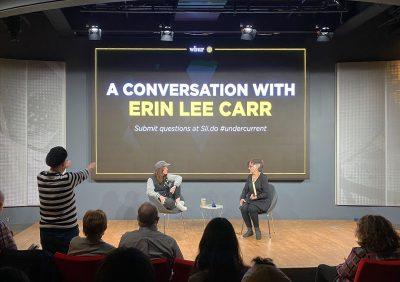Filmmaker and author Erin Lee Carr, a self-proclaimed “weird dork from New Jersey,” is not afraid to tackle controversial topics, such as corruption, suicide and criminal injustice, in her documentaries.

Carr, a two-time Emmy-nominated director, was also listed as a 2019 Forbes 30-under-30 influential person in media. Her release in 2021, “Britney vs Spears,” was met with success on Netflix, and her other prominent works have a Massachusetts angle. “How to Fix a Drug Scandal” focuses on a drug lab in Amherst and, in “I Love You, Now Die: The Commonwealth V. Michelle Carter,” Carr explores Carter’s actions that led to her boyfriend’s suicide.
In her new two-part series “Undercurrent,” Carr explores similarly intense themes through the disappearance and murder of journalist Kim Wall, who boarded a submarine to interview Danish entrepreneur Peter Madsen. Madsen was sentenced to life in prison for his role in the 2017 murder, though life imprisonment for Madsen under the Danish criminal justice system could mean only 12 years in prison.
“I present the legal case for the audience to decide,” Carr said about “Undercurrent” during a Q&A and interview session. “By proxy, I’m utilizing them as a jury member and bringing people into conversations of civic justice, utilizing the popular genre of documentary is crafty.”
WBUR CitySpace held a screening of “Undercurrent: The Disappearance of Kim Wall” on March 18.
Eliza Billingham, a graduate student in the College of Communication at Boston University, was “baffled” that she’d never heard about Kim Wall prior to the screening.
“I thought I would have heard of a journalist killed in a submarine,” Billingham said. “Even though it’s in Denmark, that seems like a rather interesting story.”
Hosting the Q&A session was “All Things Considered” host and Gracie Award winner Lisa Mullins. Carr also had a book signing for her coming-of-age memoir “All That You Leave Behind,” which attendees received for free.
Mullins noted that Carr is “supremely responsible” with her subject matter and her work “speaks well of documentary journalism.”
“There’s so much media production going on these days. So much of it is bad that when you hear someone like Erin speaking… it’s refreshing,” Mullins said.
Mullins also said that, unlike some other documentaries where “you get up in the middle of it to make popcorn,” Carr’s work is a “quality documentary” which requires hours of research, interviews and preparation.
“I know she does her homework,” Mullins said. “That’s the sign of a remarkably good and disciplined and responsible journalist.”
Carr said that although true crime documentaries get a bad rap, they’re a great way to bring attention to the institutional problems beneath the crime.
“A lot of people think of true crime as a ‘lower’ form of documentary, but I really think that you can elevate it … to have these societal conversations about criminal justice, addiction and grief,” she said.
Carr said when depicting perpetrators, including Madsen, you have to be very “thoughtful” and “careful.”
“Something I thought a lot about is that Peter Madsen’s worst nightmare would be that he would be depicted as a failure,” Carr later said. “In fact, he was a failure.”
Meera Raman, a graduate student in COM, said that while her femininity has been an advantage in her reporting at times, it’s important to be careful while pursuing a story.
“As a female freelance journalist who doesn’t have a stable, steady assignment each and every week, you unfortunately have to be on guard with every project you take on and each person you talk to,” Raman said. “It shouldn’t be that way, but it is.”
Despite taking on a slate of hard-hitting topics in her work, ones that deal with misogyny, murder and more, Carr finds a way to stay grounded in her personal life.
“I have a great therapist, an amazing dog, a very cute fiance and I watch a ton of tennis,” she said.



























































































































